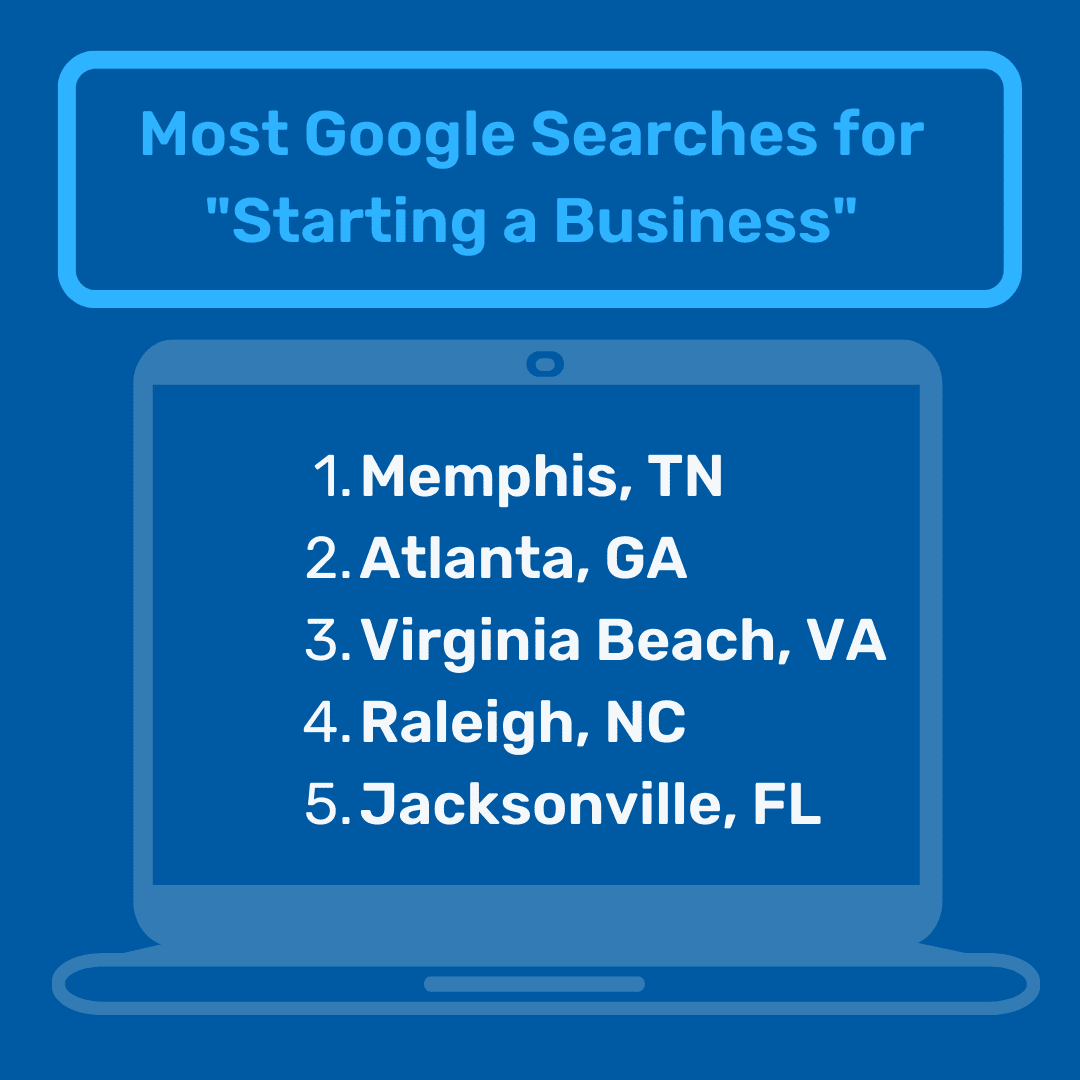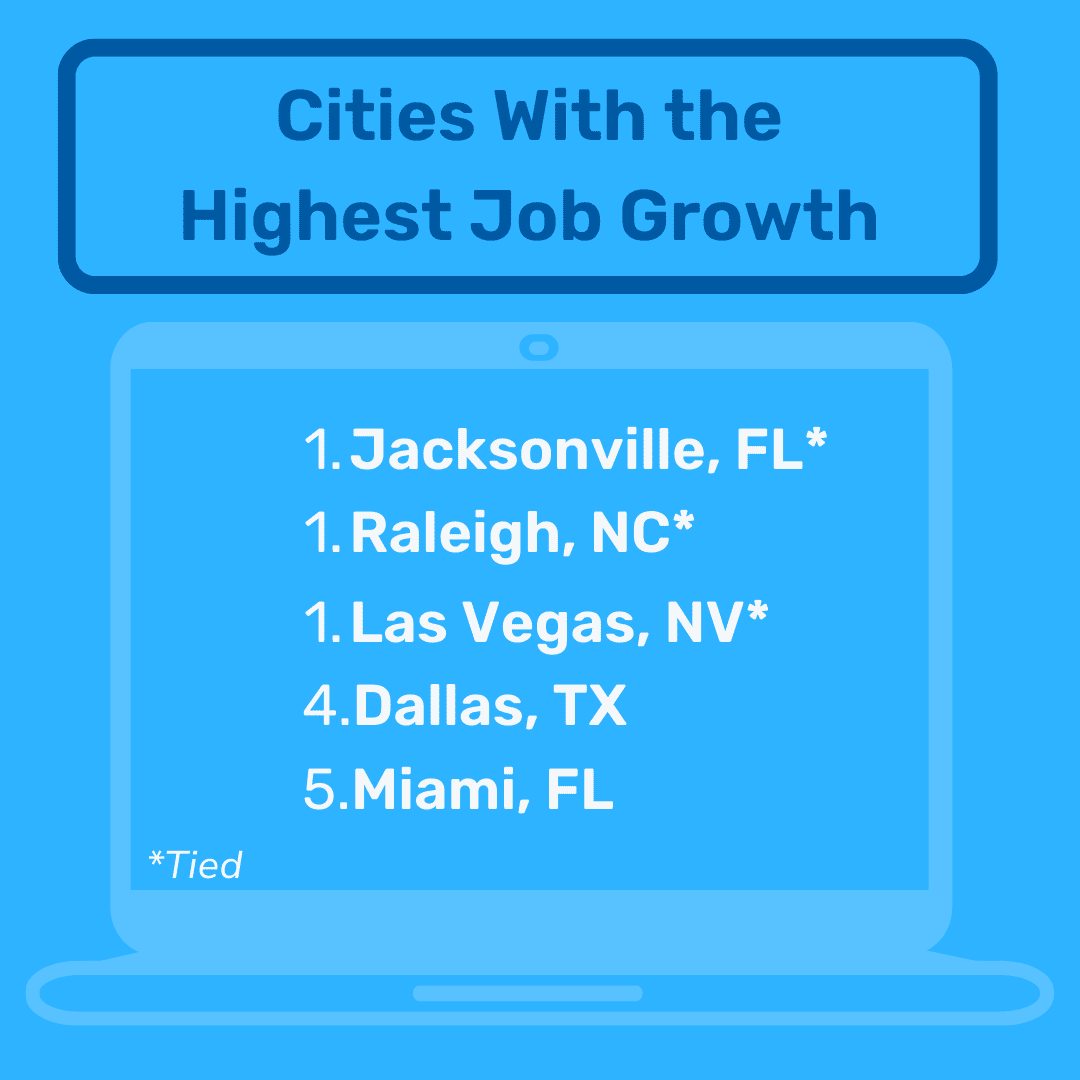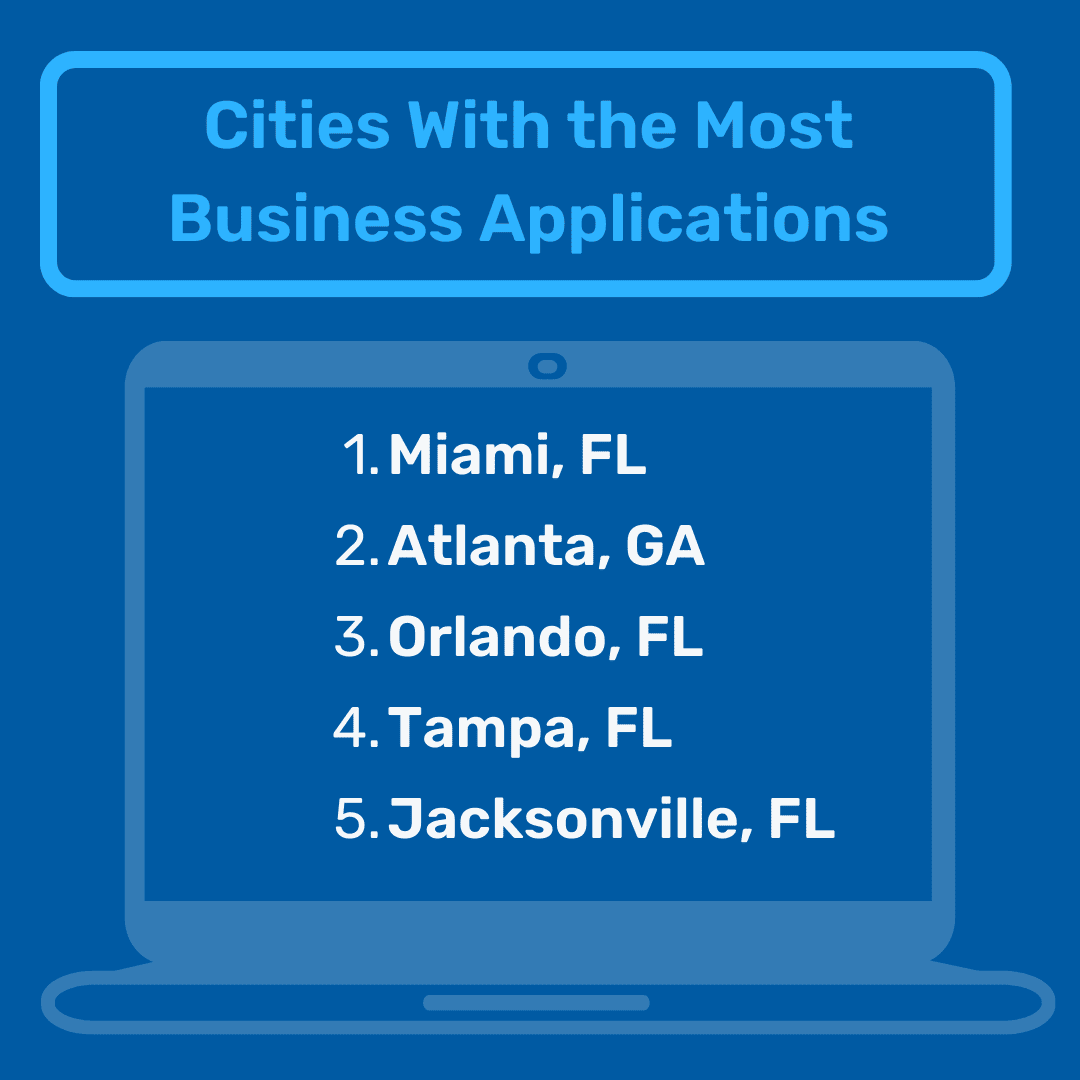🚀 Where’s the best state to start a business in 2024? 🚀
Florida is the best state for startups, with Miami, Orlando, Tampa, and Jacksonville all ranking in the top 10 cities to start a business.
Best Startup Cities, Ranked | 15 Best Startup Cities | Rankings by Category | 10 Worst Startup Cities | Methodology
Even in volatile economic times, business is booming across the U.S. Americans filed a record-breaking 5.5 million new business applications in 2023 as they attempt to solve new problems and meet changing consumer demand in the post-pandemic world.
Starting a business is a quintessential part of the American dream, but doing so comes with serious risks. Approximately 20% of new businesses fail in the first 12 months, and 45% don’t survive the first five years.
Choosing the right location for a new business is imperative for entrepreneurs. The best cities can help startups survive by creating an environment that attracts affordable skilled workers and boasts business-friendly tax laws and easy access to capital.
In fact, 35% of Americans think cities should do more to cater to startup companies, according to a recent Clever poll.
To determine the best cities for startups, we analyzed publicly available data from the U.S. Census Bureau, the Bureau of Labor Statistics, the Bureau of Economic Analysis, PitchBook, Google Trends, and more.
Our weighted rankings evaluated various criteria, including:
- 3x: Venture capital funding at the metro level over the past 12 months
- 3x: Employment growth at the metro level over the past 12 months
- 2x: Business applications per 1,000 residents filed in the last five years
- 2x: Percent of the population with a bachelor’s degree or higher
- 2x: Chief executives per 100,000 residents
- 2x: Average annual income
- 1x: Marginal corporate tax rate at the state level
- 1x: Google Trends data for business-related keywords, such as “starting a business,” “business loans,” and “venture capital”
Keep reading to find out if your city is preparing for takeoff or failing to launch.
💻 Startup City Statistics
- Atlanta is the best city for startups in the U.S. with strong business growth, a large talent pool, and low startup costs.
- Providence is the worst city for startups because it struggles to access venture capital — earning just $46 million last year, which is the lowest amount among the 50 most populous cities in the U.S.
- San Francisco receives more venture capital funding than any other city. Its startups netted $30.9 billion last year — 65x more than the average city’s $475 million.
- Miami ranks No. 1 for business applications filed in the past five years, with 35.3 per 1,000 residents. That’s nearly 2.5x more than the 14.5 applications filed in the average city.
- Buffalo had the fewest applications, with just 7.8 per capita in that same time period.
- Raleigh and Jacksonville are tied for the fastest job growth in the U.S. over the past 12 months. Jobs grew at a rate of 3.8% in these two cities, which is more than double the studied-city average of 1.7%.
- Meanwhile, Memphis recorded negative job growth at -0.6%.
- Denver is one of the most affordable places to start a business, with the lowest LLC filing fee ($50) and the lowest incorporation filing fee ($50) among all cities studied.
- Sacramento is the best city for executive networking, with 156 CEOs per 100,000 residents, compared to 59.7 nationwide.
- San Jose has the most educated workforce, with 41% of the city’s population holding a bachelor’s degree or higher.
- Florida is the best state for startups, with Miami, Orlando, Tampa, and Jacksonville all ranking in the top 10 cities to start a business.
The 50 Best Startup Cities, Ranked
| Rank | City | Business Apps / 1K Residents (2018–2022) | Venture Capital / Metro | Job Growth (Nov. 2022–Nov. 2023) | Average Annual Income | CEOs / 100K Residents | % of Population With Bachelor’s Degree | Corporate Tax Rate | Business Passion Score*** | Quality of Life Score**** | |
| 1 | Atlanta, GA | 28.5 | $1.1 billion | 2.5% | $64,107 | 118.3 | 29.6% | 6.4% | 86 | 6.4 | |
| 2 | Miami, FL | 35.3 | $1.9 billion | 3.0% | $77,732 | 83.2 | 27.8% | 5.5% | 90 | 6.2 | |
| 3 | Orlando, FL | 23.4 | $267 million | 1.9% | $53,959 | 70.2 | 27.0% | 5.5% | 76 | 6.8 | |
| 4 | Tampa, FL | 19.6 | $395 million | 1.9% | $60,091 | 80.8 | 26.5% | 5.5% | 76 | 6.8 | |
| 5 | Austin, TX | 15.7 | $3.3 billion | 2.8% | $75,119 | 26.4 | 37.6% | 2.6% | 82 | 6.6 | |
| 6 | San Francisco, CA | 11.8 | $30.9 billion | 1.1% | $123,736 | 137.3 | 40.9% | 8.8% | 100 | 6.8 | |
| 7 | Washington DC | 15.8 | $2.3 billion | 1.4% | $83,010 | 105.0 | 39.3% | 8.3% | 93 | 7.2 | |
| 8 | Jacksonville, FL | 18.8 | $167 million | 3.8% | $62,729 | 59.7** | 26.6% | 5.5% | 60 | 6.8 | |
| 9 | Charlotte, NC | 16.1 | $442 million | 2.5% | $65,156 | 24.3 | 29.2% | 2.5% | 78 | 6.4 | |
| 10 | Dallas, TX | 15.9 | $2.5 billion | 3.3% | $70,493 | 19.5 | 27.3% | 2.6% | 80 | 6.1 | |
| 11 | Los Angeles, CA | 14.9 | $8.8 billion | 1.7% | $76,445 | 96.3 | 27.8% | 8.8% | 74 | 5.3 | |
| 12 | New York, NY | 16.0 | $17.8 billion | 1.2% | $84,084 | 20.0 | 32.9% | 18.3% | 100 | 7 | |
| 13 | Raleigh, NC | 15.2 | $1.6 billion* | 3.8% | $70,628 | 17.5 | 36.4% | 2.5% | 84 | 7.2 | |
| 14 | Philadelphia, PA | 15.5 | $1.6 billion | 2.7% | $73,291 | 59.7** | 31.2% | 15.8% | 67 | 6.3 | |
| 15 | Denver, CO | 18.7 | $3 billion | -0.4% | $84,788 | 10.0 | 36.5% | 4.6% | 78 | 6.5 | |
| 16 | Salt Lake City, UT | 17.3 | $1.2 billion | 2.0% | $65,085 | 135.1 | 25.5% | 4.9% | 73 | 6.7 | |
| 17 | Boston, MA | 10.2 | $14.3 billion | 2.4% | $94,082 | 59.7** | 38.9% | 8.0% | 79 | 7.3 | |
| 18 | Las Vegas, NV | 18.7 | $545 million | 3.8% | $59,150 | 22.4 | 19.3% | 0.6% | 53 | 5.9 | |
| 19 | Phoenix, AZ | 14.5 | $1.6 billion | 1.9% | $61,840 | 35.5 | 25.0% | 4.9% | 74 | 6 | |
| 20 | San Diego, CA | 10.9 | $3.5 billion | 1.4% | $74,326 | 86.4 | 31.0% | 8.8% | 69 | 6.7 | |
| 21 | San Jose, CA | 9.3 | $30.9 billion | 1.0% | $141,516 | 119.2 | 41.3% | 8.8% | 100 | 7.4 | |
| 22 | Riverside, CA | 9.6 | $8.8 billion | 1.8% | $50,407 | 47.8 | 16.6% | 8.8% | 74 | 5.3 | |
| 23 | Seattle, WA | 11.4 | $3.4 billion | 2.0% | $92,113 | 52.3 | 35.2% | 6.7% | 71 | 6.6 | |
| 24 | Richmond, VA | 14.6 | $124 million | 2.7% | $68,205 | 68.0 | 30.4% | 7.6% | 60 | 6.8 | |
| 25 | Houston, TX | 15.7 | $889 million | 2.3% | $68,344 | 17.3 | 24.4% | 2.6% | 77 | 5 | |
| 26 | Baltimore, MD | 14.6 | $509 million | 1.8% | $71,420 | 81.1 | 32.6% | 8.3% | 74 | 6.6 | |
| 27 | Nashville, TN | 13.6 | $1.6 billion | 2.1% | $74,035 | 100.6 | 29.8% | 6.5% | 62 | 6.1 | |
| 28 | Chicago, IL | 14.3 | $1.9 billion | 0.9% | $72,512 | 54.6 | 30.1% | 9.5% | 70 | 6.4 | |
| 29 | Virginia Beach, VA | 13.9 | $2.2 billion* | 0.6% | $57,873 | 52.6 | 24.8% | 7.6% | 62 | 6.9 | |
| 30 | Detroit, MI | 16.7 | $427 million | -0.4% | $61,322 | 29.5 | 25.4% | 8.0% | 68 | 6.1 | |
| 31 | Minneapolis, MN | 11.1 | $1.1 billion | 1.5% | $75,164 | 133.7 | 32.5% | 9.8% | 62 | 6.9 | |
| 32 | St. Louis, MO | 12.6 | $701 million | 1.7% | $69,698 | 50.3 | 28.1% | 4.6% | 60 | 6.1 | |
| 33 | Sacramento, CA | 10.0 | $143 million | 2.2% | $66,940 | 156.0 | 26.0% | 8.8% | 62 | 6.2 | |
| 34 | Indianapolis, IN | 14.3 | $139 million | 2.4% | $68,719 | 24.3 | 27.3% | 4.9% | 67 | 6.3 | |
| 35 | Columbus, OH | 12.9 | $315 million | 0.5% | $61,228 | 53.7 | 28.3% | 3.7% | 66 | 6.6 | |
| 36 | Pittsburgh, PA | 8.6 | $1.6 billion | 1.4% | $65,792 | 102.2 | 29.2% | 15.8% | 57 | 6.8 | |
| 37 | Cleveland, OH | 13.7 | $173 million | 1.8% | $62,921 | 42.7 | 27.0% | 3.7% | 57 | 6.6 | |
| 38 | Kansas City, MO | 12.1 | $251 million | 0.8% | $63,417 | 67.9 | 28.5% | 4.6% | 54 | 6.3 | |
| 39 | San Antonio, TX | 10.5 | $167 million | 2.6% | $55,180 | 12.1 | 22.5% | 2.6% | 63 | 5.9 | |
| 40 | Portland, OR | 11.5 | $358 million | 1.2% | $69,435 | 26.3 | 31.1% | 15.7% | 67 | 6.7 | |
| 41 | Oklahoma City, OK | 14.3 | $184 million* | 1.4% | $60,687 | 87.7 | 23.3% | 4.0% | 62 | 5.9 | |
| 42 | Birmingham, AL | 13.9 | $311 million | 3.0% | $62,262 | 18.8 | 25.8% | 6.0% | 59 | 6.3 | |
| 43 | Cincinnati, OH | 10.3 | $114 million | 1.8% | $65,253 | 44.6 | 26.4% | 3.7% | 55 | 6.7 | |
| 44 | New Orleans, LA | 16.7 | $43 million | 2.4% | $61,801 | 9.6 | 25.2% | 5.9% | 57 | 5.9 | |
| 45 | Memphis, TN | 17.6 | $1.6 billion* | -0.6% | $56,440 | 51.0 | 22.2% | 6.5% | 55 | 4.8 | |
| 46 | Louisville, KY | 11.8 | $132 million | 0.9% | $61,490 | 67.7 | 25.7% | 7.2% | 45 | 6.3 | |
| 47 | Milwaukee, WI | 13.0 | $66 million | 0.4% | $68,155 | 85.9 | 28.3% | 7.9% | 55 | 6.7 | |
| 48 | Buffalo, NY | 7.8 | $144 million | 0.9% | $56,414 | 18.9 | 27.5% | 18.3% | 40 | 7 | |
| 49 | Hartford, CT | 9.3 | $842 million* | 0.7% | $69,787 | 10.6 | 31.0% | 7.5% | 64 | 7.3 | |
| 50 | Providence, RI | 8.3 | $46 million* | 0.4% | $63,746 | 30.5 | 27.7% | 7.0% | 58 | 7 | |
| *Metro data unavailable. State data provided. **Data not available. The average among all 50 cities studied was provided. ***Based on Google Trends data and scaled from 0 to 100. ****Based on U.S. News & World Report’s Best Places to Live ranking and scaled from 0 to 10. | |||||||||||
The 15 Best Cities for Startups
1. Atlanta, Georgia
🏅 The Best City for Startups
Strong business growth, a large talent pool, and low operating costs make Atlanta the best city to start a business — up from No. 5 in our 2022 ranking.
Atlanta may be home to mega corporations such as Coca-Cola, Chick-fil-A, and Delta Air Lines, but young companies play a big role in Atlanta’s economic ecosystem. Over the past five years, Atlanta has the second-highest number of new business applications with 28.5 per 1,000 residents — nearly double the number in the average U.S. city (14.5).
A filed application is no guarantee of a successful business, but it does signal that entrepreneurs are optimistic about a city’s prospect. Atlanta has a track record of turning startups into stable companies, but big businesses on the block don’t overshadow the city’s thriving startup scene. Rather, they make good neighbors. With 118 CEOs per 100,000 residents, Atlanta has 2x more chief executives than the national average — making it one of the best places to network and learn from proven business owners.
Georgia’s capital has more than 25 incubators and accelerators to help scale small businesses, but many bootstrapping entrepreneurs are learning to grow on their own terms. Atlanta residents search the web for business-related keywords 25% more often than residents in other cities. They are particularly interested in “business financing” and “business loans,” ranking No. 1 and No. 2 in search volume for those terms, respectively.
2. Miami, Florida
🌊 A Wave of New Businesses
Miami ranks No. 1 for business applications filed in the past five years, with 35.3 per 1,000 residents. That’s nearly 2.5x the number filed in the average city (14.5).
Business has boomed in Miami over the past five years, and it doesn’t appear to be slowing down anytime soon. In addition to having the most business applications filed in that time frame, Miami also ranked No. 1 for business applications filed last year, with a whopping 40.9 per 1,000 residents. The proliferation of new businesses has led to impressive job growth, which increased at a rate (3%) nearly 2x faster than the national average (1.7%) over the past 12 months.
The booming business climate can be attributed to the growth in venture capital. Startups based in the Sunshine State received nearly $3 billion in funding last year, with Miami businesses earning the most among all Florida cities with $1.9 billion. That’s 4x more venture capital than the average city receives ($475 million).
Miami residents are clearly interested in financing options, ranking No. 3 in Google search volume for “business loans” and No. 5 for “business financing.”
3. Orlando, Florida
🎶 Let’s Get Down to Business
The third-best city for startups also ranks third for business applications filed in the past year (28.7 per 1,000 residents) and business applications filed in the past five years (23.4).
Entrepreneurs don’t have to wish upon a star when Orlando has everything they need to make their business dreams come true.
Economic conditions are quite favorable for businesses in the Sunshine State, with an incorporation filing fee of just $79, compared to $137 across all cities studied. Better yet, Florida has one of the lowest corporate tax rates at 5.5%, which is 22% lower than the studied-city average (7.1%).
The city boasts a relatively low cost of doing business. Labor costs, for example, are the second-most affordable among all cities studied. The average Orlando employee earns an annual income of $53,959, which is 23% lower than the studied-city average ($70,443%).
With year-round warm weather, world-renowned theme parks, and acclaimed dining options, Orlando businesses should have no trouble attracting local and out-of-state talent. In fact, U.S. News & World Report ranks Orlando as the 10th-best place to live overall and the 11th-best city for quality of life.
4. Tampa, Florida
🏖️ Silicon Coast
Florida’s hot streak continues with Tampa, which cracked the list of top 15 startup cities for the second time — rising from No. 6 in 2022.
Like most cities in Florida, business costs in Tampa are low because of friendly tax laws. Tampa has the added benefit of an affordable workforce, with the average worker earning $60,091 a year — about 15% less than the studied-city average ($70,443).
From beautiful beaches to an affordable cost of living, Tampa has a lot to offer local employees. U.S. News & World Report ranked it the No. 5 best place to live overall and the No. 11 best place to live for a high quality of life.
Entrepreneurs and investors believe that a high quality of life will accelerate business growth, and Tampa residents seem eager to launch their own startup. They scored a 76 out of 100 in our passion metric, which measures how often locals search Google for business-related terms. What’s more, Tampa residents filed the fourth-most business applications per capita last year. Their 24.5 applications per 1,000 residents is 60% more than the studied-city average of 16.7.
Tampa also secured nearly $395 million in venture capital funding in 2023, which is the second-highest amount among Florida’s four most-populous cities. That number is likely to increase with Wall Street investor Cathie Wood’s recent settlement in the Tampa area. The relocation of her $60 billion investment firm is a resounding endorsement of Tampa’s ability to nurture small businesses.
5. Austin, Texas
🤠 Tex-ceptional Talent
Nearly 38% of Austin residents have earned at least a bachelor’s degree, making it the fifth-most educated populace among all 50 cities studied.
Over the past several years, Austin has transformed from a quirky college town into a hotbed for new startups. Now, the business environment is hotter than a Texas summer.
The success of homegrown brands such as Dell, YETI, and Whole Foods is luring other entrepreneurs to the area. Last year, residents filed 19.2 business applications per capita — 28% more than in the average city (16.7). So much business development has led to rapid job growth, which increased by 2.8% over the past 12 months, compared to 1.7% nationwide.
Austin’s rise can be attributed to a high-skilled workforce, which is 30% more likely than workers in other cities to hold a bachelor’s degree or higher. The metro area boasts 20 higher education institutions, including the University of Texas — the state’s flagship university and one of the best in the U.S.
These institutions have fostered innovative relationships with the business community that have attracted investors to the area. Texas startups received about $6.7 billion in venture capital funding last year, with about half of that going to Austin-based businesses. Austin’s $3.3 billion in venture capital is nearly 7x more than the average city receives ($475 million). It’s no surprise Austin ranks No. 4 in online search volume for the term “venture capital.”
6. San Francisco, California
💰 Bay Area Bucks
San Francisco receives more venture capital funding than any other city. Its startups netted $30.9 billion last year — 65x more than the average city’s $475 million.
The Bay Area has been synonymous with the startup scene since launching major companies like Cisco and Wells Fargo. But there’s a prevailing narrative that astronomical costs are causing the city’s startup ecosystem to lose its luster.
Residents filed just 11.8 business applications per 1,000 residents over the past five years — 19% less than the studied-city average (14.5). It may be difficult for San Franciscans to get their businesses off the ground, but that hasn’t diminished their passion. They search the web for business-related terms 45% more often than entrepreneurs in other cities. In fact, they earned a perfect 100 in our Google Trends metric and ranked No. 1 in search volume for the keywords “startup” and “venture capital.”
Starting a business in San Francisco comes with a level of credibility and prestige that makes this city one of the best for executive networking. It boasts the second-highest number of CEOs per capita, with 137.3 per 100,000 residents, which is more than double the number in the average city (59.7).
Moving outside this sphere could limit entrepreneurs’ ability to stay connected with other innovators and restrict their access to available talent. The Bay Area is home to several prestigious universities — including Stanford and Berkeley — which has led to a highly educated workforce. About 41% of the population has a bachelor’s degree or higher, compared to 29% in the average city.
7. Washington, D.C.
🇺🇲 Young, Scrappy, and Hungry
D.C. entrepreneurs aren’t throwing away their shot. They search the web for business-related keywords 35% more than residents in the average city. In fact, the city’s Google Trends score of 93 out of 100 is the fourth-highest in the U.S.
Entrepreneurs looking for an educated workforce, venture capital funding, and a high quality of life will find all that and more in Washington, D.C. The District is home to a number of acclaimed schools — including Georgetown, Howard, and American universities — leading to some of the most qualified talent in the country. D.C. has the third-most educated workforce, with 39% of residents holding at least a bachelor’s degree, compared to 29% in the average city.
Many graduates go on to become experienced local executives, resulting in about 105 CEOs per 100,000 residents in Washington, D.C. That’s 76% more than in the average city (59.7). In addition to networking and mentorship opportunities, the District has more than 30 incubators, accelerators, and coworking spaces to help businesses flourish.
With its array of historical sites, world-class museums, and great walkability, D.C. is an incredible place to live — ranking No. 4 in U.S. News & World Report’s Best Places to Live quality of life score. It’s also a great place to tap into financing options. D.C. startups captured $2.3 billion in venture capital funding last year — about 5x more than the average city ($475 million).
8. Jacksonville, Florida
💼 Jobs for Jax
Jacksonville thrives in Florida’s startup climate, with jobs growing at a rate (3.8%) that is more than double the national average (1.7%).
Jacksonville may be the last Florida city in our top 15, but it’s by no means the least. In 2023, the metro area had the fastest job growth among all 50 cities studied thanks to many new businesses that have opened their doors in recent years.
In the past five years, Jacksonville residents have filed 18.8 business applications per 1,000 residents — 30% more than the average city (14.5). In 2022, that number rose to 22.3, which is 46% more than the average city (16.7).
Not only is Jacksonville a great place to start a business, it’s also a great place to live. U.S. News & World Report ranked it the No. 4 best overall place to live and the No. 11 best place to live for a high quality of life.
9. Charlotte, North Carolina
💸 Business on a Budget
North Carolina has the second-lowest corporate income tax rate at just 2.5% — which is 65% lower than the studied-city average (7.1%).
Charlotte’s emerging startup scene is proving Queen City is more than just a banking town. With homegrown companies such as LendingTree proving small businesses can make it big in Charlotte, more entrepreneurs are planning to take the plunge. The city scored a 78 out of 100 in our Google Trends metric, ranking No. 4 for “business plan,” No. 4 for “small business,” and No. 5 for “business loans.”
In the past year, Charlotte residents filed 19.3 business applications per 1,000 residents — 29% more than the studied-city average (16.7). That’s led to job creation at a rate of 2.5% in the past year, compared to 1.7% across all cities studied.
The biggest challenge for Charlotte startups is access to venture capital. Last year, new businesses received about $442 million in venture capital — roughly 7% less than the average city ($475 million). However, a growing number of resources exist to help fill the gap. Tabbris, for example, is an incubator that helps provide access to capital, while BLKTECHCLT provides consulting and networking services to entrepreneurs of color.
10. Dallas, Texas
🚀 Ready for Liftoff
Dallas entrepreneurs eager to take their startup to new heights frequently search the web for business-related terms, scoring an 80 out of 100 in our Google Trends metric — 16% higher than the average city’s score (69).
Austin’s startup scene may steal most of the limelight, but Dallas actually outshines its southern neighbor in many key metrics. Dallas leads all Texas cities in business applications per capita over the past five years, with 15.9 per 1,000 residents. As a result, jobs grew by 3.3% last year — the highest rate in Texas and the fourth-highest rate in the U.S.
Dallas also offers a lower cost of living than Austin and a lower cost of doing business than other major startup hubs in California and New York. Texas has no personal income tax, and its corporate tax rate is the third-lowest at just 2.6%.
The startup-friendly environment in Dallas has helped local companies, such as Texas Instruments and Southwest Airlines, become corporate giants, whose presence breeds mentorships and funding opportunities for early-stage companies. In 2023, the Dallas metro area received $2.5 billion in venture capital funding — 5x more than the average city ($475 million).
11. Los Angeles, California
⭐ City of Startups
Numerous celebrities call L.A. home, but the city is also becoming an attractive location for successful business owners. There are 96.3 CEOs per 100,000 residents in Los Angeles — 61% more than in the average city (59.7).
Although it’s best known for its entertainment industry, Los Angeles has emerged as California’s new business hub outside the tech epicenter in the northern part of the state. In fact, Los Angeles leads all California cities in business applications over the past five years with 14.9 per 1,000 residents — 26% more than the 11.8 in runner-up San Francisco.
The convergence of tech, entertainment, media, fashion, and food makes Los Angeles’ startup scene incredibly diverse and primed for innovation. Multiple programs, such as the Seasoned Accelerator for food entrepreneurs, provide a supportive environment for startups to succeed.
In addition, easy access to capital has propelled many startups to success. L.A. entrepreneurs received about 18x more venture capital last year than the average city with $8.8 billion — the third-most in California and the fifth-most overall.
12. New York, New York
🧠 Big Apple Brainiacs
New York entrepreneurs have access to one of the most educated workforces in the U.S. About 33% of New York’s population has a bachelor’s degree or higher, compared to 29% in the average city.
New York is home to some of the world’s largest corporations, but the city is built on the backs of small businesses. Of the 200,000 businesses located in New York City, 98% are small, with fewer than 100 employees.
New Yorkers show a measurable passion for business, scoring No. 3 in our Google Trends metric, based on search activity for related keywords. That includes ranking No. 1 for the term “small business,” No. 1 for “business plan,” No. 4 for “startup,” and No. 5 for “venture capital.”
Thanks to the city’s unparalleled financial sector, investors are in no short supply. Last year, New York received about $17.8 billion in venture capital funding — the third-highest amount among all cities studied. With local startups earning about 37x more venture capital than the average city, New York entrepreneurs have a considerable advantage.
13. Raleigh, North Carolina
📈 Growth Mindset
Raleigh is tied with Jacksonville for the fastest job growth in the U.S. over the past 12 months. Jobs grew at a rate of 3.8%, which is more than double the studied-city average of 1.7%.
As an important spoke in the Research Triangle — comprising North Carolina State, North Carolina, and Duke universities — Raleigh is home to a hyper-educated workforce. About 36% of the population has earned at least a bachelor’s degree, compared to 29% in the average city.
Entrepreneurs from these universities are causing business to boom. In the past year, Raleigh residents have filed 21% more business applications than residents in the average city. And more startups are potentially on the way. Raleigh ranks No. 4 in search volume for the keyword “starting a business” and No. 5 for “business plan.” Overall, the city has the seventh-highest passion score at 84 out of 100 — 22% higher than the average city’s score of 69.
Employees can enjoy a comfortable lifestyle in Raleigh, which U.S. News & World Report ranked as the No. 1 place to live overall and the No. 4 best place to live for a high quality of life. Meanwhile, companies that employ them can grow thanks to low operating costs. Not only does North Carolina have the second-lowest corporate tax rate, the state’s LLC filing fee is just $125 — 20% lower than the studied city average ($156).
14. Philadelphia, Pennsylvania
🔔 A Ringing Endorsement
Philadelphia’s flourishing business scene has resulted in more jobs, which grew at a rate of 2.7% over the past 12 months, compared to 1.7% across all cities studied.
Philadelphia has always had a strong startup culture. After all, the U.S. was founded in the City of Brotherly Love. Nearly 250 years later, the political capital has moved to our No. 7 startup city, but the city remains a breeding ground for innovators with big ideas.
In addition to great learning and networking opportunities through Philly Tech Week, the city has great funding options. Philly received $1.6 billion in venture capital last year — about 3x more than the average city ($475 million).
With the University of Pennsylvania, Temple, and Villanova all nearby, the city also has plenty of smart, talented graduates in the workforce. About 31% of Philadelphia’s population has a bachelor’s degree or higher, compared to 29% in the average city.
15. Denver, Colorado
⛰️ Low Prices in Mile High
Denver is one of the most affordable places to start a business with the lowest LLC filing fee ($50) and the lowest incorporation filing fee ($50) among all cities studied.
Colorado’s startup scene is flying high with 18.7 business applications per 1,000 residents in the past five years and 21.6 applications in the past year. That’s 29% and 42% more applications than in the average city, respectively.
With its beautiful natural landscape and promising career opportunities, the Mile High City consistently attracts college students from around the country and is considered the sixth-most educated metro in our study. Nearly 37% of Denver residents have at least a bachelor’s degree, compared to 29% in the average city.
Venture capitalists have noticed all that Denver has to offer and invested $3 billion in Denver startups last year — about 6x more than the $475 million invested in the average city.
Top 5 Rankings by Category
 |  |
 |  |
 |  |
 |  |
 |  |
The 10 Worst Startup Cities
Sadly, not all startup cities achieve unicorn status. The worst cities for startups are:
- Providence, Rhode Island
- Hartford, Connecticut
- Buffalo, New York
- Milwaukee, Wisconsin
- Louisville, Kentucky
- Memphis, Tennessee
- New Orleans, Louisiana
- Cincinnati, Ohio
- Birmingham, Alabama
- Oklahoma City, Oklahoma
As a group, these cities failed to launch because of sluggish job growth, low online search volume for business-related terms, and low venture capital funding at the metro and state level.
Providence, the worst city to start a business, particularly suffers from a lack of outside investment. Among states we studied, Rhode Island attracts the least amount of venture capital at $46 million — 98% less than the average state receives.
With little financial help to get their businesses off the ground, Providence residents filed the second-fewest business applications over the past five years — 8.3 per 1,000 residents, compared to the national average of 14.5.
Fewer job opportunities in Providence have led to slow job growth, with employment rising just 0.4% over the past 12 months, compared to 1.7% nationwide.
That’s not to say Providence doesn’t have its strengths. Rhode Island’s capital has one of the highest quality of life scores from U.S. News & World Report, and our previous research named Providence one of the 10 best cities for coffee in America.
Methodology
Home Bay compared the 50 most populous U.S. metro areas across 12 metrics, listed below. Each metric was normalized and graded on a 100-point scale. The combined weighted average of each score determined the overall “startup city” score upon which the final ranking was based.
In cases where data sets included only cities, the city data was combined and weighted by population within the overall metro in which the city belonged. In cases where data sets included only counties, county data was crosswalked with metropolitan data. In cases where data sets included only states, the state where the largest portion of the metro is located was used.
The metrics used are as follows:
- Business applications per 1,000 residents in the past five years (15.4%)
- Venture capital investment by metro (11.5%)
- Job growth by metro from November 2022 to November 2023 (11.5%)
- Business applications per 1,000 resident in the past year (7.7%)
- Venture capital investment by state (7.7%)
- Employee affordability based on average personal income (7.7%)
- Percent of population with a bachelor’s degree or higher (7.7%)
- CEOs per 100,000 residents (7.7%)
- LLC filing fees (3.8%)
- Incorporation filing fees (3.8%)
- Top marginal corporate income tax rate (3.8%)
- Google Trends data (3.8%)
- U.S. News & World Report Best Places to Live — overall score (3.8%)
- U.S. News & World Report Best Places to Live – quality of life score (3.8%)
Data sources include the U.S. Census, Pitchbook, Dealroom, Google Trends, the U.S. Bureau of Labor Statistics, Upcounsel, the U.S. Bureau of Economic Analysis, the American Legislative Exchange Council, and U.S. News & World Report.
Additional data was acquired from a survey of 1,000 Americans on Dec. 22-23, 2023, concerning their opinions on startups.
About Home Bay
Where your real estate voyage begins. Since 2014, Home Bay has helped thousands of readers confidently sail through their next home sale or purchase. In 2021, Home Bay was acquired by Clever Real Estate, a free agent-matching service that has helped consumers save more than $160 million on real estate fees. Research by Home Bay’s Data Center has been cited by The New York Times, CNBC, MarketWatch, NPR, Apartment Therapy, Yahoo Finance, Black Enterprise, and more.
More Research From Home Bay
Articles You May Like
FAQs
Strong business growth, a large talent pool, and low startup costs make Atlanta the best city to start a business — up from No. 5 in our 2022 ranking. Learn more.
San Francisco receives more venture capital funding than any other city. Its startups netted $30.9 billion last year — 65x more than the average city’s $475 million. Learn more.
Entrepreneurs can enjoy a comfortable lifestyle in Raleigh, which U.S. News & World Report ranked as the No. 1 place to live overall and the No. 4 best place to live for a high quality of life. Learn more.






